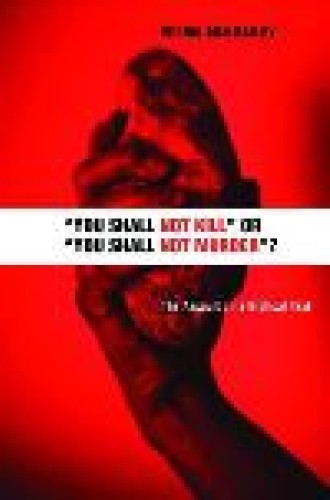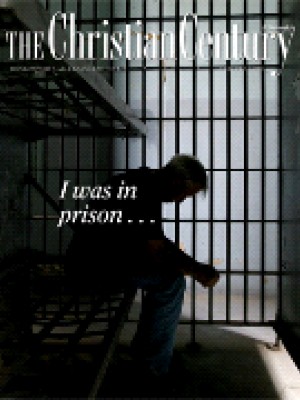Killing words
"You Shall Not Kill" or "You Shall Not Murder?" The Assault on a Biblical Text. By Wilma Ann Bailey. Liturgical Press.
This thin book carries a bracing punch. It is aimed at biblical translators, but its interpretive jabs also strike church and synagogue, as well as cultural understandings of life and death in the United States. In addition to making a radical cultural critique, Wilma Ann Bailey stakes out biblical translation and interpretation as crucial activities for social and religious reform.
Bailey is an associate professor of Hebrew and Aramaic scripture at Christian Theological Seminary in Indianapolis. Her argument has two parts. First, she claims that the Hebrew of Exodus 20:13 should be translated "you shall not kill," not "you shall not murder." To murder is to take human life with evil intent and refers to illegal killing. To kill is to take human life (perhaps not animal) for any reason at all. It is the latter that Bailey believes to be prohibited by the Exodus commandment.
Read our latest issue or browse back issues.
In view of present quarrels about placing the Decalogue in courthouses as a beacon of legal and ethical principles, Bailey's book creates a full-throttle disruption of religious assumptions. The implications of her work are that Exodus 20:13 forbids not only euthanasia, but also probably abortion at any stage, though she does not discuss abortion. "Do not kill" also prohibits war, capital punishment, defensive shootings, and indirect support of killing by acquiescence to government-sponsored taking of human life. Not everyone wants to hear this.
The second part of Bailey's argument builds on the first. She examined translations of the commandment in modern English Bibles produced by evangelical Protestantism, mainline Protestantism, Judaism and Roman Catholicism and discovered that in the last part of the 20th century "you shall not murder" everywhere displaced "you shall not kill," except in Roman Catholic translations. Before that time most English Bibles favored "do not kill." The move from "do not kill" to the narrower "do not murder" marks a significant shift in cultural and ethical thinking.
Bailey's arguments about the disputed verb in Exodus 20:13 are strong, clear and accessible but not airtight. In defense of my translator friends, the Hebrew itself allows for ambiguity, as Bailey readily demonstrates. The verb occurs 13 times in the Hebrew Bible—with a wide range of meanings. Bailey begins with ambiguous occurrences and sometimes finds various meanings even within the same text. In other instances, "kill," not "murder," is the only possible translation—for example, in texts about cities of refuge for killers that protect even unintentional killers (Deut. 4:42; Num. 35:27). The point of Bailey's word study is that the verb does not automatically yield the meaning "murder." So far so good.
Next Bailey deals with the Bible's own inconsistency in its position on killing. The case law of Exodus 21, for example, lists offenses meriting capital punishment. How could God prohibit killing in one chapter and permit it in the next? In some texts God even seems to condone war and killing. But Bailey agrees with most contemporary critical interpreters that the Bible is a collection of the work of multiple witnesses gathered over time. Inevitably it is theologically and ethically inconsistent. This means that the Ten Commandments carry more moral weight than case law or other biblical texts where killing is unquestioned.
For Bailey the commandment becomes, in a sense, a proof text to prohibit killing, one verse chosen above others to guide us today. Perhaps the cultural dominance of the Decalogue gives weight to this choice, but it leaves open the question of how the Bible functions in contemporary communities. Even if Bailey is right—and I think she is—does the Bible form a legal blueprint for life today, or is it an inspired collection of voices and visions demanding engagement and reinterpretation? The answer will be denominationally specific.
Bailey further claims that the Bible never presents God commanding a battle or authorizing killing. But passages in Jeremiah portray God as aggressor and sender of the enemy army, and Lamentations accuses God of killing the people on the day of anger (2:21). To counter killing texts, Bailey rightly selects one set of texts over others, for example, "What does God require of you but to do justice, to love kindness, and to walk humbly with your God?" (Micah 6:8). Finally, Bailey observes that the Ten Commandments prohibit widespread behaviors such as stealing, adultery, coveting and lying. "Do not kill" is the better translation because killing is more widespread than murder.
But Bailey's larger charge is that "murder" has trumped "killing" because denominational affiliations determine translators' moral stances on the taking of human life. Bailey contends that the shift began with evangelical Protestants who were becoming increasingly inclined toward a promilitary and prowar patriotism. Other religious groups moved in the same direction and found biblical warrant to support their views, fusing God and state. Liberal mainline Protestants followed the same cultural trend. In 1989 the New Revised Standard Version changed the "do not kill" of the Revised Standard Version to "do not murder." Jewish translations followed suit, finding support in the interpretations of the esteemed 12th-century rabbis Rashbam and Bekhor Shor.
The Catholic exception in holding to "do not kill," consistent with its pro-life teaching, illustrates Bailey's claim of denominational influence. But even if my fellow Roman Catholic translators maintain "do not kill," the lived reality is not so different from that in other denominations because the Catholic Church does not follow the principle of sola scriptura. Even though the text says "do not kill," Catholic practice is equally selective. Catholicism holds with unbending certitude to not killing the unborn, but it permits just wars and argues over capital punishment. Bailey's book demands a new consciousness. A "do not kill" translation may not settle the question, but it certainly unsettles the situation as it is now.






